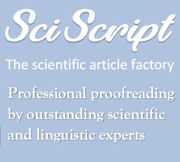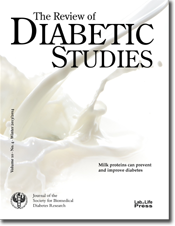Review
| Rev Diabet Stud,
2013,
10(4):228-235 |
DOI 10.1900/RDS.2013.10.228 |
Metformin and Cancer
Natalia G. Vallianou1, Angelos Evangelopoulos2, Christos Kazazis3
1First Department of Internal Medicine, Evangelismos General Hospital, 10676 Athens, Greece
2Roche Diagnostics Hellas, 15125, Maroussi, Athens, Greece
3Honorary Lecturer, School of Medicine, University of Leicester, University Rd, Leicester, LE1 9HN, UK
Address correspondence to: Natalia G. Vallianou, MD, PhD, First Department of Internal Medicine, Evangelismos General Hospital, 45-49 Ipsilantou str, 10676 Athens, Greece, e-mail: natalia.vallianou@hotmail.com
Manuscript submitted October 10, 2013; resubmitted October 22, 2013; accepted October 30, 2013.
Keywords: AMPK, LKB1, metformin, doxorubicin
Abstract
Metformin is well-known as an anti-diabetic drug, but it seems to possess anti-cancerous properties as well. Adenosine monophosphate-activated protein kinase (AMPK) is a highly conserved regulator of the cellular response to the presence of low energy in all eukaryotic cells. It is considered a key sensor of the balance of cellular ATP and AMP concentrations. LKB1 serine/threonine kinase is a divergent yet evolutionarily well-conserved kinase, biochemically sufficient to activate AMPK in vitro and genetically required for AMPK activation. Because of this potent connection to AMPK, LKB1 may act as a central regulator of metabolism in vivo. Once activated, AMP kinase phosphorylates the transcriptional activator TorC2, thereby blocking its nuclear translocation and inhibiting the expression of genes involved in gluconeogenesis. Data suggest that LKB1/AMPK signaling plays a role in protection from apoptosis, specifically in response to agents that increase the cellular AMP/ATP ratio. Active AMPK signaling offers a protective effect by providing the cell with time to reverse the aberrantly high ratio of AMP/ATP. If unable to reverse this ratio, the cell will eventually undergo cell death. These observations offer the provocative suggestion of a potential therapeutic window in which LKB1-deficient tumor cells may be acutely sensitive to AMP analogues or sensitized to cell death by other stimuli when treated in combination with agents that increase the AMP/ATP ratio. LKB1 therefore is a classical tumor suppressor. AMPK is a direct LKB1 substrate. A consequence of AMPK activation by LKB1 is the inhibition of the mammalian target of rapamycin (mTOR) C1 pathway. Metformin's anti-cancerous properties have been demonstrated in various cancer cells in vitro, such as lung, pancreatic, colon, ovarian, breast, prostate, renal cancer cells, melanoma, and even in acute lymphoblastic leukemia cells. To test metformin's action in vivo, mice were implanted with transformed mammary epithelial cells and treated with three cycles of metformin and with the anthracycline doxorubicin. When combined with doxorubicin, metformin wiped out tumors and prevented recurrence. Metformin alone had no effect, and doxorubicin as a single agent initially shrank tumors, but they regrew later. Virtually no cancer stem cells were recovered immediately after treatment and the complete response was sustained for nearly two months. Further studies are needed to assess the anti-cancerous potentials of metformin in vivo. This article reviews the current knowledge on the actions of LKB1/AMPK and the effectiveness of metformin in cancer, specifically in diabetes patients.
Fulltext:
 HTML
, HTML
,  PDF
(146KB) PDF
(146KB)
This article has been cited by other articles:
.jpg)
|
Metformin in Lung Cancer: Review of in Vitro and in Vivo Animal Studies
Yousef M, Tsiani E
Cancers (Basel) 2017. 9(5):45
|
|

|
Metformin suppresses the expression of Sonic hedgehog in gastric cancer cells
Song Z, Wei B, Lu C, Huang X, Li P, Chen L
Mol Med Rep 2017. 15(4):1909-1915
|
|

|
Impact of H3K27 Demethylase Inhibitor GSKJ4 on NSCLC Cells Alone and in Combination with Metformin
Watarai H, Okada M, Kuramoto K, Takeda H, Sakaki H, Suzuki S, Seino S, Oizumi H, Sadahiro M, Kitanaka C
Anticancer Res 2016. 36(11):6083-6092
|
|

|
Clinical outcome of treatment with serine-threonine kinase inhibitors in recurrent epithelial ovarian cancer: a systematic review of literature
Ciccone MA, Maoz A, Casabar JK, Machida H, Mabuchi S, Matsuo K
Expert Opin Investig Drugs 2016. 25(7):781-796
|
|

|
Co-delivery of polymeric metformin and cisplatin by self-assembled core-membrane nanoparticles to treat non-small cell lung cancer
Xiong Y, Zhao Y, Miao L, Lin CM, Huang L
J Control Release 2016. 244(Pt A):63-73
|
|

|
AMP-activated protein kinase activator, HL156A reduces thioacetamide-induced liver fibrosis in mice and inhibits the activation of cultured hepatic stellate cells and macrophages
Lee HS, Shin HS, Choi J, Bae SJ, Wee HJ, Son T, Seo JH, Park JH, Kim SW, Kim KW
Int J Oncol 2016. 49(4):1407-1414
|
|

|
Metformin in ovarian cancer therapy: A discussion
Ouyang Y, Chen X, Zhang C, Bunyamanop V, Guo J
Cancer Transl Med 2016. 2(4):119-124
|
|

|
Cardioprotective effect of metformin against doxorubicin cardiotoxicity in rats
Tseng YT
Anatol J Cardiol 2016. 16(4):242-243
|
|

|
Prostate Cancer Stem Cells: Research Advances
Jaworska D, Krol W, Szliszka E
Int J Mol Sci 2015. 16(11):27433-27449
|
|

|
Metformin: An Old Drug for the Treatment of Diabetes but a New Drug for the Protection of the Endothelium
Kinaan M, Ding H, Triggle CR
Med Princ Pract 2015. 24(5):401-415
|
|

|
mTOR signaling in the kidney health, disease and therapy
Huang C
J Nephrol Res 2015. 1(2):40-48
|
|
|
 Metformin and Cancer (146KB)
Metformin and Cancer (146KB)




.jpg)










